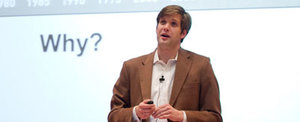Low-cost health care faces high hurdle
Published: February 3, 2012 / Author: Ed Cohen

Innovations that are helping to deliver health care inexpensively to the world’s poor could slash the cost of health care in wealthier countries too, said an officer of the Bill & Melinda Gates Foundation said. But he said he doubts it will happen.
Andrew Serazin, senior program officer in the foundation’s Global Health Discovery Division, told business students at the University of Notre Dame’s Mendoza College of Business that simple paper-based diagnostic tests and other innovations are replacing expensive equipment and procedures in the Third World. They’re helping to save lives and maximize relief efforts, he said.
But “entrenched interests” would likely oppose their introduction in the United States, he predicted, because they would “completely disrupt the cost structure” of health care.
A 2003 Notre Dame graduate (biological sciences) and former Rhodes Scholar, Serazin heads a Gates Foundation team that examines new scientific approaches and technologies for maternal, neonatal and child health. He spoke Feb. 2, 2012, as part of the business college’s Ten Years Hence lecture series, which explores issues, ideas and trends likely to affect business and society over the next decade.
Serazin cited statistics showing that for most people, even the world’s poor, life is getting better, and the improvements are accelerating.
Child deaths globally have dropped 50 percent in the past 50 years, Serazin said. He attributed the gains to a rapid rise in vaccination rates–the single largest area of investment by the Gates Foundation–greater access to life-saving treatments like antiretroviral therapy for AIDS patients; and wider use of insecticide-treated bed nets to fight mosquito-spread malaria in Africa.
Serazin said not long ago the malaria problem was thought to be insurmountable.
“Now I talk to companies in Africa who are distributing bed nets and they’re worried not about getting financing to pay for new purchases, they’re worried about market saturation,” he said. “They’re thinking about what they can do to modify the nets, maybe make some blue color and some pink color for boys and girls.”
Serazin described several low-cost medical innovations that have helped reduce infant mortality and other health issues. He even demonstrated one: the Odeon Device, a kind of plastic bag that is fitted around the head and neck of an infant during delivery and inflated. It replaces the use of pliers-like metal forceps to extract an infant from the birth canal.
Serazin said the Odeon Device was invented by a car mechanic in Argentina after he saw a group of mechanics in his shop remove a cork that had fallen inside a wine bottle. The mechanics inserted a bag into the bottle and turned it upside down so that the cork rested in the bag. They then blew into the bag and pulled. Out came bag and cork – for the mechanics and in Serazin’s demonstration.
Serazin also described new kinds of simple, fluid diagnostic tests made by printing chemicals on paper. The paper is dipped into a fluid, which then rises up into the paper by capillary action.
Serazin later said the technology exists today to turn one’s cell phone into a device that, together with a paper strip, could be used to diagnose whether one had a cold or something more serious.
The question is whether such devices would ever be allowed to be used in developed countries, he said.
“I think that … companies making diagnostics wouldn’t want that future to occur because it would undermine their business,” he said.
The Ten Years Hence series is sponsored by the O’Brien-Smith Leadership Program, made possible by a generous endowment from William H. O’Brien (ND ’40) and his wife, Dee. The O’Brien-Smith Program endowment provides an opportunity for students and faculty to interact with distinguished leaders from business, government and nonprofit sectors.
/news_and_events/news_articles/article/10656/low-cost-health-care-faces-high-hurdle




